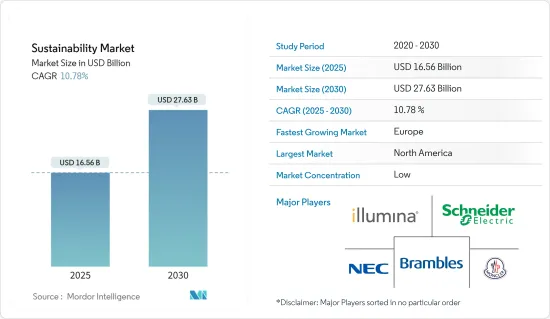PUBLISHER: Mordor Intelligence | PRODUCT CODE: 1651072

PUBLISHER: Mordor Intelligence | PRODUCT CODE: 1651072
Sustainability - Market Share Analysis, Industry Trends & Statistics, Growth Forecasts (2025 - 2030)
The Sustainability Market size is estimated at USD 16.56 billion in 2025, and is expected to reach USD 27.63 billion by 2030, at a CAGR of 10.78% during the forecast period (2025-2030).

The sustainability market spans diverse sectors dedicated to environmental preservation, social responsibility, and economic viability. Key areas include renewable energy, sustainable agriculture, waste management, green building, and eco-friendly products. Across the globe, companies are heavily investing in sustainability and green technology, driven not only by legal requirements but also by a commitment to broader environmental objectives. These investments encompass a range of areas, from creating eco-friendly products and energy-efficient technologies to implementing sustainable supply chain practices and embracing renewable energy sources.
Furthermore, businesses are dedicating funds to research and development, aiming to minimize their carbon footprint and craft sustainable solutions. Furthermore, to leverage combined resources and expertise, strategic alliances and partnerships are on the rise. Additionally, environmental, social, and governance (ESG) factors are gaining prominence in the investment landscape, attracting funds from socially conscious investors.
Sustainability Market Trends
Surge in Green Building Initiatives is Boosting Market Growth
Prioritizing energy efficiency, green buildings are significantly cutting down on energy consumption. This is not only reducing operational costs for owners but also boosting the market for energy-efficient technologies and solutions. Numerous companies are committing to sustainability, often aligning their facilities with green building standards. Corporate demand is fueling the expansion of the sustainability market, with businesses increasingly pursuing eco-friendly solutions. Designs of green buildings often prioritize improved indoor air quality and occupant well-being. This growing awareness is amplifying market interest in health-focused building products and technologies. Consumers are increasingly gravitating towards sustainable living. With a rising consciousness about climate change and environmental challenges, consumers are favoring products and buildings that resonate with their values, thereby propelling the growth of the green building sector.
Increasing Demand for Sustainability Market in Europe
In Europe, consumer awareness of sustainability is on the rise. As European consumers grow more concerned about environmental issues, their preference for sustainable products and services intensifies. This shift is shaping market trends and prompting companies to embrace greener practices. The EU is driving a greener economy through initiatives like the Deforestation-Free Products Regulation and the Packaging and Packaging Waste Regulation, which are significantly impacting business operations. Companies are increasingly adopting sustainable practices, thanks in part to technological advancements like energy-efficient solutions and sustainable materials. These innovations are pivotal in helping firms meet their sustainability objectives. Meanwhile, the EU has set its sights on achieving climate neutrality by 2050. This goal addresses climate change risks and bolsters the EU's strategic autonomy, competitiveness, social economy model, and global leadership in the net-zero economy.
Sustainability Industry Overview
The sustainability market is fragmented. During the forecast period, it is poised for growth, intensifying competition. The competitive landscape includes all the strategies players use to maintain their market share globally, such as acquisitions and mergers. The major players in the market include Schneider Electric, NEC Corporation, Moncler, Brambles, and Illumina.
Additional Benefits:
- The market estimate (ME) sheet in Excel format
- 3 months of analyst support
TABLE OF CONTENTS
1 INTRODUCTION
- 1.1 Study Assumptions and Market Definition
- 1.2 Scope of the Study
2 RESEARCH METHODOLOGY
3 EXECUTIVE SUMMARY
4 MARKET DYNAMICS
- 4.1 Market Overview
- 4.2 Market Drivers
- 4.2.1 Companies are Making Sustainability a Core Aspect of their Operations through Increased Adoption of CSR Strategies
- 4.2.2 Rising Environmental Awareness Fuels Market Growth
- 4.3 Market Restraints
- 4.3.1 High Initial Costs is Restraining the Market
- 4.3.2 Market Growth Hindered by Lack of Awareness on Sustainable Practices
- 4.4 Market Opportunities
- 4.4.1 Companies, Governments, and NGOs Collaborate to Drive Innovation and Expand Market Reach
- 4.5 Value Chain / Supply Chain Analysis
- 4.6 Porters 5 Force Analysis
- 4.6.1 Threat of New Entrants
- 4.6.2 Bargaining Power of Buyers/Consumers
- 4.6.3 Bargaining Power of Suppliers
- 4.6.4 Threat of Substitute Products
- 4.6.5 Intensity of Competitive Rivalry
- 4.7 Insights on Technological Innovations in the Market
- 4.8 Insights on Regulatory Framework in the Market
- 4.9 Impact of COVID-19 on the Market
5 MARKET SEGMENTATION
- 5.1 By Component
- 5.1.1 Solutions
- 5.1.2 Services
- 5.2 By Technology
- 5.2.1 Internet of Things (IoT)
- 5.2.2 AI and Analytics
- 5.2.3 Digital Twin
- 5.2.4 Others (Cloud Computing, Blockchain)
- 5.3 By Application
- 5.3.1 Green Building
- 5.3.2 Carbon Footprint Management
- 5.3.3 Air and Water Pollution Monitoring
- 5.3.4 Weather Monitoring and Forecasting
- 5.3.5 Fire Detection
- 5.3.6 Crop Monitoring
- 5.3.7 Others (Soil Condition/Moisture Monitoring and Forest Monitoring)
- 5.4 Geography
- 5.4.1 North America
- 5.4.1.1 US
- 5.4.1.2 Canada
- 5.4.1.3 Mexico
- 5.4.1.4 Rest of North America
- 5.4.2 Europe
- 5.4.2.1 Germany
- 5.4.2.2 UK
- 5.4.2.3 France
- 5.4.2.4 Russia
- 5.4.2.5 Spain
- 5.4.2.6 Rest of Europe
- 5.4.3 Asia Pacific
- 5.4.3.1 India
- 5.4.3.2 China
- 5.4.3.3 Japan
- 5.4.3.4 Rest of Asia Pacific
- 5.4.4 South America
- 5.4.4.1 Brazil
- 5.4.4.2 Argentina
- 5.4.4.3 Rest of South America
- 5.4.5 Middle East
- 5.4.5.1 UAE
- 5.4.5.2 Saudi Arabia
- 5.4.5.3 Rest of Middle East
- 5.4.1 North America
6 COMPETITIVE LANDSCAPE
- 6.1 Market Concentration
- 6.2 Company Profiles
- 6.2.1 Schneider Electric
- 6.2.2 NEC Corporation
- 6.2.3 Moncler
- 6.2.4 Brambles
- 6.2.5 Illumina
- 6.2.6 SGS
- 6.2.7 Sanofi
- 6.2.8 NRI
- 6.2.9 Telefonica
- 6.2.10 Cigna*
7 MARKET FUTURE TRENDS
8 DISCLAIMER AND ABOUT US




